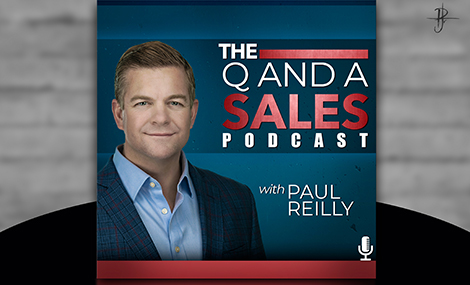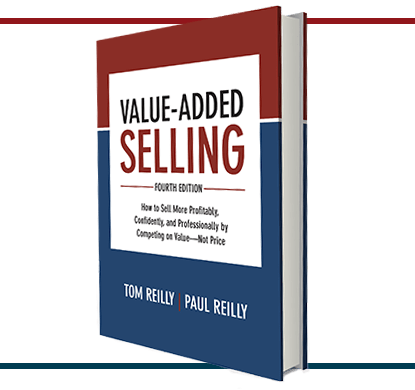Paul gets real about those barriers that keep you from maxing out those monthly quotas.
Show Notes
Are you crushing it one month and then hitting a wall? Complacency affects performance.
“The conversation you have in your mind is a predictor of how you’re going to perform.”
“Your belief in your solution has to be stronger than the customer’s doubt.”
Self-pity and self-doubt do nothing for you. Do something to strengthen your mental resilience.
***
Visit www.ToughTimer.com to get started on the 30-Day Tough-Timer Challenge!
Pre-order your copy of Selling Through Tough Times from Amazon or Barnes & Noble!
Click here to purchase the latest edition of Value-Added Selling.
Thanks to our production team at The Creative Impostor Studios!
Click here to book a complimentary consultation with Strategist and Producer, Andrea Klunder, to find out how to launch, produce, and grow your company’s podcast.
***
Thank you for tuning in. Our show is updated weekly with the questions you ask. So, please go to the home page to ask the question that you want answered.
Be sure to follow our show in your favorite podcast app and share this episode with a colleague or friend.
And most importantly…make it a big day.
What stops you from performing at your best?
(Transcribed from podcast)
Well, lately, we’ve had fed some great guests on the show. We had Marty just on the show last week. Before that we had Carson Heady. We’ve got some great guests coming up as well which leads me to my next point. If you want to be on the podcast, if you’ve got a sales question you want to have answered, make sure you visit TheQandASalesPodcast.com. While you’re there, you can ask me a question and I’ll turn it into a future show.
In fact, on today’s episode, we are going to answer a question. This question is from Kari. Kari is in the pharmaceutical industry, and she wants to know, “What stops you from performing?” What stops you from performing? I think we’ve all been there in sales. We’ve been in a slump. We have moments of frustration. We have those valleys that we go through before we can get to the peaks. And Kari wants to know what causes that. What stops us from performing. So that’s what we’re going to address on today’s show.
Now, before we get into that question, we need to thank our sponsors. Andrea, over at The Creative Impostor Studios, is the podcasting queen—I mean, is absolutely your go-to resource. If you’re starting a podcast, if you have one already and you’re looking to, boost it and make it better, improve it, enhance it, Andrea is there for you. So, podcasting, again, it’s a great way to connect with your audience. I know anytime I need help, Andrea is right there. So reach out to her. We’re going to have a link over to her website. Again, The Creative Impostor Studios—that’s Andrea’s company. Reach out to her. She is there to help.
And also, Kari asked us, “What stops you from performing?” When I think of that question, I can’t help but think of my new book coming out, Selling Through Tough Times. The whole first section of this book is about building the right mindset, building the right mentality to go out there and perform. And many of the things I’ll talk about on today’s show are going to be in the new book. So the new book, Selling Through Tough Times, is available on Amazon, or Barnes & Noble, or Chapters for pre-order. It’s not available quite yet. Next month, the book is coming out. But until then, you can get your pre-order copy ready. We’ll have a link to that on this website will have a link to that on this episode’s webpage.
Let’s get back to that question: What keeps us from performing? I’m going to share a couple of thoughts and ideas. And as we go through this, I want you to think about some of the times you’ve struggled to perform in your profession and see if any of these can relate.
One of the first things we have to address is laziness. Now there are some salespeople out there that are just lazy, where they don’t feel like putting in the effort. They don’t feel like putting in the time. They don’t want to make the extra calls. Laziness is one of the reasons we stop performing. We all have those months where maybe we just don’t feel like working, or maybe we have a quarter where we’re just kind of taking it easy or we’re just not giving it our all. So that laziness piece that will affect performance, obviously.
Now another thing that can lead to laziness and complacency is good performance and satisfaction. This is kind of interesting. Think about it. If you are a salesperson and, let’s say, let’s say for four or five quarters in a row, you’re just crushing it. You’re hitting your number and things are just kind of happening. Stuff is falling into your lap. If you get into a habit of just being able to accept and walk into these deals, laziness can set in. Because we think, “Oh wow! This stuff’s just happening.” Right now, we’re at moments of peak demand. Things are just going well. It’s going to continue to go like this and we almost become complacent. So that complacency piece can then affect performance, because when things do start to slow down—when there is more supply than there is demand—we start to get into a slump, because we’re used to things just coming easy to us. When things come easy to us, that’s when complacency can set in. So be aware of that. That’s one of the things that can hamper performance.
Now let’s get into some more of the psychological pieces. I want you to remember, the most important conversation you’re ever going to have in sales is the conversation between your two ears: how you talk to yourself. If you want to predict your future success, listen to your thoughts. The conversation you have in your mind is a predictor of how you’re going to perform and be successful. Now, in the new book, in Selling Through Tough Times, we talk about a few common themes. There [are] moments of self-doubt. That’s one of the mental mistakes that sellers make that will impact performance. They doubt their abilities. They doubt that they’re going to be able to make it happen. They doubt that their solution is the right fit for the customer. Think about it. If you are getting ready to go into a presentation for a customer and you’re telling yourself, ‘Neh, I just don’t know if this is the right fit,’ that is going to impact your performance. Your belief in your solution has to be stronger than the customer’s doubt. So we have to make sure that, more than anyone, we 100% believe in what we’re doing and what we are supplying, what we are selling, the solution that we are providing.
Now, another thing that’s similar to self-doubt is it’s just a self-limiting belief. Self-limiting belief. I see this with salespeople where they almost just mentally give up or they’ll say things like, “Oh, I could never win over a prospect like that. I can never get an opportunity that big. I don’t even think our company could handle that much business.” These self-limiting beliefs impact your performance.
In the new book, I use an analogy: the analogy of an elephant tied to a rope. Now here’s what happens. The mighty elephant—the mighty elephant can actually be contained by a rope and a stake that is only driven inches into the ground. And the reason why is simple. When an elephant is born in captivity—not a wild elephant, but an elephant born in captivity—when they are born, a trainer can take a rope and put it around their neck or their leg or wherever, and then they can stake that rope into the ground just a couple of inches. And as a newborn calf, (I think elephants are called), they’re not able to break free from that rope. They’re not able to remove that stake from the ground. So, what happens, that elephant, as they grow, they are held captive still by their own mindset because they believe that that stake in the ground is their limit. So they will stay within the confinements of that rope. Even as they grow into a mighty adult elephant, they still can be held captive. And the reason they’re held captive is because of their mindset.
Now think about how often that happens in sales, where we limit our abilities, we limit our success by not fully believing in it. And what’s even worse is not even believing that it’s possible. So those self-limiting beliefs, those are things that we have to absolutely crush.
The other thing is self-pity. I see this often from salespeople who complain. And I don’t want to make it sound like I’m training a bunch of salespeople that don’t believe in themselves, that aren’t confident, that lack performance. I would say almost 90%, 80-90% of the salespeople that I’m working with, they want to go out there and succeed. They have a positive attitude. Their mindset is where it needs to be. But there is going to be that bottom 20% that are struggling mentally. I think that’s what Kari’s referring to is how you, what keeps us from performing when we fall into that 20%. So that’s what we’re talking about here.
And so, one thing that I noticed from this group that is struggling to perform is they feel sorry for themselves: self-pity. Let me ask you a question. When’s the last time you felt better after feeling sorry for yourself? Probably never, right? And I hear this from salespeople who complain constantly, “Oh, we don’t have the product to sell,” or “You know what? We charge much higher than our competition,” or “This prospect never calls me back.” Whatever the complaining is, that complaining and feeling sorry for yourself does nothing. It hampers your performance. You start to believe the thoughts that run through your mind, so you might as well make them positive.
So, when we think about what stops us from performing, it’s that self-pity, it’s the self-doubt, it’s just that self-limiting belief—and it could be laziness and complacency. All of those things will impact our performance. If you find yourself talking trash to yourself; if you find yourself believing some of those self-limiting beliefs, then it’s time to build some mental strength. It’s time to look for ways to improve and get better. It’s time to build some resilience and get back out there and perform at the levels that you know you can.
So, if this episode has resonated with you, if you find yourself thinking in these terms, make a positive change. And one thing you can do to help with that is begin the 30-day Tough-Timer Challenge. On the previous episode—like two episodes ago—I talked about what that challenge is. It’s about building mental strength and resilience. And so, we’ll have a link back to that episode on this webpage. But the 30-day Tough-Timer Challenge involves a series of six mental exercises we call the Daily Mental Flex. It’s something you do every single day. It can help.
So everyone, that is the show today. A shout-out to Kari. Thank you for visiting the website and asking the question.
Make it a big day.


